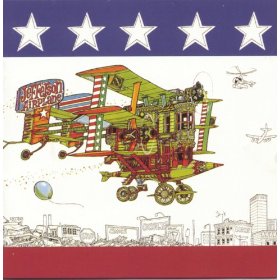Jefferson Airplane founding member Paul Kantner’s death at age 74 on Jan. 28 has been met by a mainstream culture shrug compared to the celebratory attention paid rock stars dead in the past month including David Bowie, the Eagles’ Glenn Frey and Scott Weiland of Stone Temple Pilots. Why?
In one hour since posting this, I’ve been besieged with Facebook comments that mourning is indeed being done and cultural note taken, like this New York Times obituary. A credible editor tells me there’s been more coverage of Kantner “by a pretty far margin” than of Frey. So, I’m pleased to stand corrected, and apologies for my glib headline.
Kantner was a visionary, a prince of the Summer of Love who in the late ’60s stirred the ears and fed the heads of an obstreperous generation. Initially a banjoist and 12-string guitar player, he was the man behind After Bathing At Baxter’s, one of the era’s most enduringly satisfying breakthrough albums.
By most testimony, Kantner was a hard guy to deal with. “A sometimes prickly, often sarcastic musician who keeps his own counsel and routinely enrages his old bandmates” is how pop music critic Joel Selvin described him in a 2008 interview in the Chronicle. In eulogies, Kantner’s former collaborators have nuanced their appreciation. As Marty Balin, the Airplane’s original impetus and most lyrical songwriter told Billboard‘s Gary Graff: “He was a hard-headed guy to get along with and wouldn’t do anybody else’s music. We had to do what he could do, so that’s what we all did eventually. We pretty much just did Paul’s music. That’s all he wanted to do.”
Jorma Kaukonen, the Airplane’s fearless guitarist, issued a statement saying, “In my opinion Paul was the catalyst that made the alchemy happen. He held our feet to the flame. He could be argumentative and contentious … he could be loving and kind … his dedication to the Airplane’s destiny as he saw it was undeniable. Over the years he and I occasionally butted heads over things that seem trivial today.â€
Grace Slick, whose searing singing was the Airplane’s most obvious trademark and who had a daughter named China (b. 1971)Â with Kantner, simple Tweeted, “Rest in Peace my friend. Love, Grace.”
I never spoke to or met Kantner, but as a listener I think he deserves more applause. Although I caught the Airplane live during its rise in ’67 and its fall in ’71, those shows didn’t thrill me — it’s the recordings that still fuel my enthusiasm. I consider Baxter’s, the Airplane’s third album, beyond category. Upon release in ’67 it was unprecedented, attaining heights of incisiveness, conceptual sophistication and successfully experimental pop music comparable only to the Beatles’ Sgt Pepper, released five months earlier. And today it still sounds hard, fresh, at moments profound.
Baxter’s is a studio creation flush of melodic drama and drive over 11 songs in five related suites, comprising soaring vocals, a sound collage, a wicked jam and exotic woodwinds arrangements. The tunes including “The Ballad of You & Me & Pooneil,” “Martha,” “Young Girl Sunday Blues,” “Wild Tyme,” “The Last Wall of the Castle,” “rejoyce,” “Watch Her Ride,” “Won’t You Try/Saturday Afternoon” are far from typical rockers or love songs, transformed by hot-wired guitar, Jack Casady’s bumptious electric bass, Spencer Dryden’s lowdown beat and the  keening singing into the highly charged, open-ended realm labeled psychedelia.
Fact is, no other American band of that musically explosive era — not the Byrds, the Mothers of Invention, the Lovin’ Spoonful, the Grateful Dead, Buffalo Springfield, the Doors, the Turtles, the Mamas and the Papas, Quicksilver Messenger Service, Paul Butterfield’s Blues Band, the Jimi Hendrix Experience or Dylan with Robbie Robertson and Nashville session players – had created a work of
such esthetic reach and multi-faceted unity. According to Jeff Tamarkin, author of Got A Revolution! The Turbulent Flight of Jefferson Airplane and other chroniclers, Kantner was the one who worked through considerable distractions to pull it together. He was also central to the Airplane’s just as mordant if not so flowing followup Crown of Creation and the more agit-prop Volunteers before flying off to sci-fi land with his own Blows Agains the Empire, and eventually Jefferson Starship.
I stopped following Kantner’s career four decades ago, but a lot of the Airplane’s music, and most especially After Bathing at Baxter’s, is indelible in my memory. However irksome Kantner may have been, I thank him for that.
Of the Airplane/Starship crowd, perhaps no one suffered more from Kantner’s ego than Marty Balin, but he, too, attests in the value of his one-time partner’s ouevre.
“It was unique,” Balin said to Billboard. “It was part of that era, part of that time. A lot of those songs still exist, still live on, still are good.” Amen and RIP — if that’s what you want — Paul Kantner.
howardmandel.com
Subscribe by Email or RSS
All JBJ posts
[contextly_auto_sidebar]


